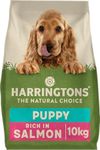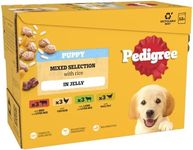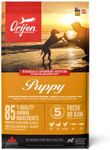Buying Guide for the Best Puppy Food
Choosing the right puppy food is crucial for the healthy growth and development of your furry friend. Puppies have different nutritional needs compared to adult dogs, and selecting the right food can support their energy levels, bone development, and overall health. When choosing puppy food, consider factors such as the breed size, age, and any specific health concerns your puppy may have. It's important to read labels carefully and understand what each ingredient and nutritional component contributes to your puppy's diet.Protein ContentProtein is essential for the growth and development of puppies as it helps build strong muscles and supports overall health. Puppy food should have a higher protein content compared to adult dog food. Generally, look for a protein content of around 22-32%. If you have a highly active breed or a working dog, you might want to aim for the higher end of this range. For less active breeds, a moderate protein level should suffice. Always ensure the protein source is high-quality, such as chicken, beef, or fish.
Fat ContentFat provides a concentrated source of energy for growing puppies and helps in the absorption of fat-soluble vitamins. Puppy food should contain a fat content of about 8-20%. Smaller or more active breeds may benefit from higher fat content to meet their energy needs, while larger breeds might require a more moderate amount to prevent excessive weight gain. Look for healthy fat sources like chicken fat or fish oil, which also provide essential fatty acids for skin and coat health.
Calcium and PhosphorusCalcium and phosphorus are vital for the development of strong bones and teeth in puppies. The ideal ratio of calcium to phosphorus should be around 1.2:1 to 1.5:1. Large breed puppies, in particular, need careful management of these minerals to prevent bone growth issues. If you have a large breed puppy, look for food specifically formulated for their needs, as it will have the appropriate balance of calcium and phosphorus.
Kibble SizeKibble size is important for ensuring that your puppy can comfortably chew and digest their food. Smaller breeds will need smaller kibble, while larger breeds can handle bigger pieces. The right kibble size can also help with dental health by reducing plaque buildup. Observe your puppy as they eat to ensure they are not struggling with the size of the kibble, and adjust accordingly if needed.
DigestibilityDigestibility refers to how well your puppy can break down and absorb the nutrients in their food. High-quality puppy food will have ingredients that are easy to digest, such as whole grains, vegetables, and high-quality proteins. If your puppy has a sensitive stomach or specific dietary needs, look for foods labeled as 'easily digestible' or 'sensitive stomach'. Monitor your puppy's stool and overall health to ensure they are digesting their food properly.
Additives and PreservativesAdditives and preservatives are used to enhance flavor and extend the shelf life of puppy food. However, some additives can cause allergies or sensitivities in puppies. It's best to choose foods with natural preservatives like vitamin E (mixed tocopherols) and avoid artificial colors, flavors, and preservatives. If your puppy has allergies or sensitivities, consult with your veterinarian to identify any specific ingredients to avoid.

















